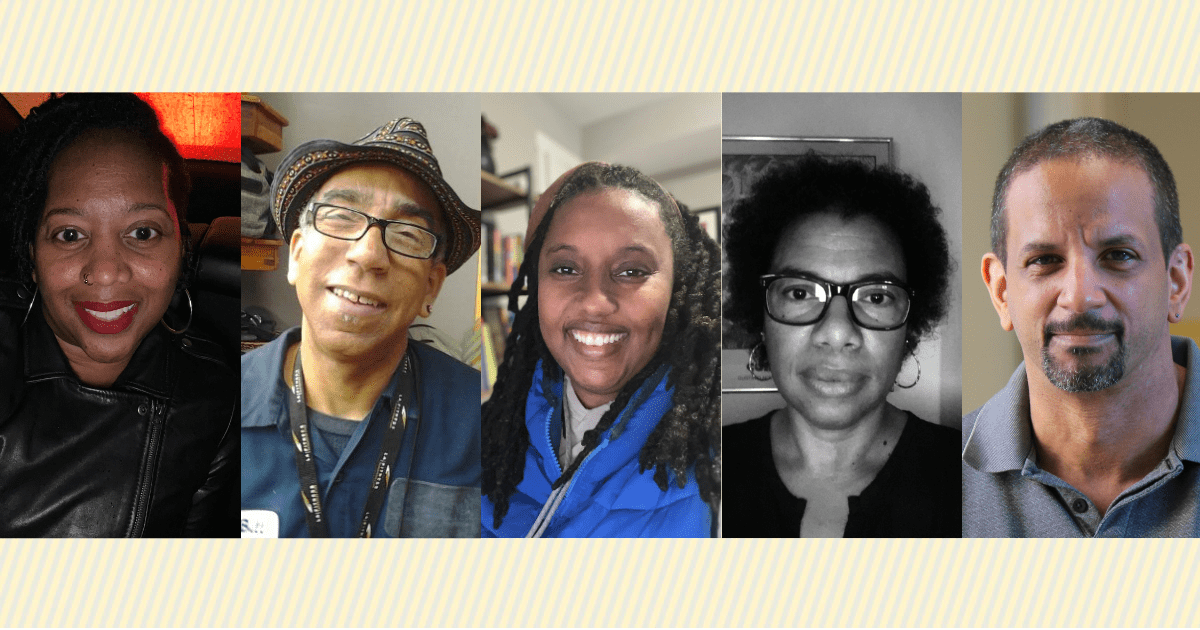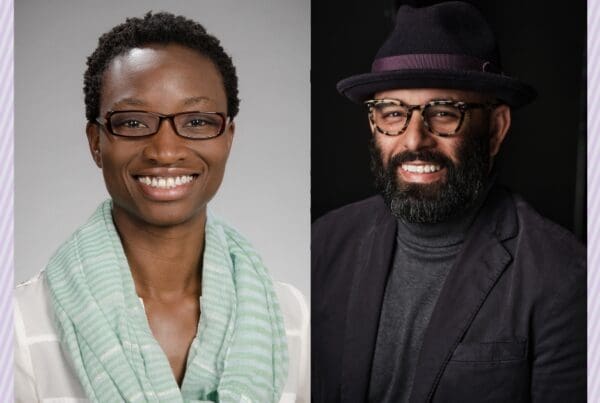Honoring the contributions of ancestors, committed to reducing healthcare inequities, and asking our community to keep working toward becoming an anti-racist organization — these are the themes shared by UW Medicine Black colleagues for Black History Month 2024.
Plus, with this year’s national theme of African Americans and The Arts, employees share how art has inspired them, from their favorite music to creating art as a form of self-care.
Read on to hear from five Black community members about what their art, heritage and culture mean to them, and what they wish more people knew about their cultural or racial identity.
Tea Florence-Moreland, Program Operation Specialist, Department of Surgery, Harborview Medical Center
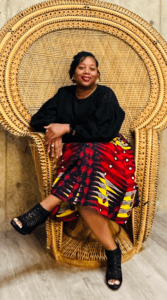
Tea Florence-Moreland
“Here are the words I think of when I think of my heritage: Representation, Powerful, Bold, Strength, Proud, Creative and Confident.
My ancestors paved the way for me to have equal rights to education, healthcare, voting, fair treatment and freedom of speech, to name a few. I recognize, honor and celebrate my ancestors with prayers of thankfulness, storytelling and singing old hymn songs.
My heritage influenced my desire to be in healthcare. Black Americans and especially Black woman have endured disparities in healthcare. I wanted to be part of the change to ensure equal opportunities for healthcare services, treatment plans and prescription drugs.
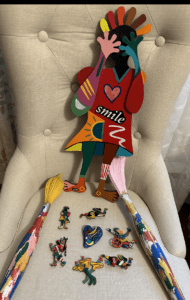
Tea’s Collection of JoeSam. art
Here’s what I want people to know about my identity. We are human and not less than. We are not the enemy. We are not aggressive if we confront microaggressions. We are a loving culture that has weathered and continues to weather storms and yet we walk with our head held high. We don’t all look alike. We welcome those willing to learn. At UW Medicine, I’d like to see the organization continue to do more to dismantle the hierarchal systemic racisms internally.
With the national theme of Black History Month being focused on the arts, I’m inspired by the self-taught artist JoeSam. His political artwork brought attention to the Jonestown Massacre, the Rodney King beating by the Los Angeles Police Department, and the Charleston shooting in Emmanuel African Methodist Episcopal Church, to name a few. The Museum of the African Diaspora in San Francisco is currently showcasing JoeSam.’s artwork.”
Ivana Thompson, MD, Associate Professor and Associate Chair of Justice, Equity, Diversity, and Inclusion, Department of Obstetrics & Gynecology, UW School of Medicine
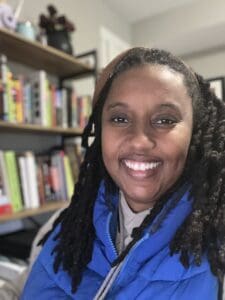
Ivana Thompson
“When I made the decision to pursue a career in healthcare, I did so with the aim of inclusive service to Black, brown and other marginalized folks. I know the value of cultural humility and culturally congruent care. I want to provide folks with an option to access care from someone who may understand where they are coming from or someone with intentional openness to listen and consider their unique perspectives and concerns.
As a healthcare system and educational entity, we need to acknowledge and honor the lived histories and experiences of our Black patients. We need to acknowledge and name the role we have played in race-based health injustice and harm. We need to lead with cultural humility and listen to our Black coworkers, patients and community members to proactively and collaboratively envision how we can better serve everyone.
The art that inspires me? Calligraphy, hand lettering and stationery are my hobbies. Handwriting has always been a point of pride for me. Practicing my lettering and writing is a calming and reflective process for me.”
William Hargrove, Supervisor, Environmental Services, UW Medical Center – Roosevelt
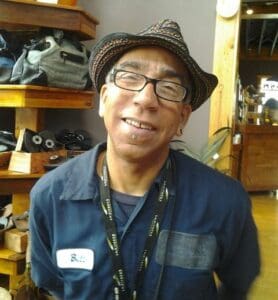
William Hargrove
“Perseverance, pər-sə-ˈvir-ən(t)s
NOUN: Continued effort to do or achieve something despite difficulties, failure or opposition: the action or condition or an instance of persevering: steadfastness
That is what my heritage means to me.
My favorite cultural traditions include family reunions and church. My grandmother had 11 brothers and sisters. We’d go to St. Louis every summer for her family reunion; it makes you feel part of something bigger when you see all these people and they are related to you. My grandmother grew up with her grandmother who was formerly enslaved, and I learned a lot from her stories of the past. We called her mama Stewart. She owned a barber shop in Detroit for over 30 years. She took my dad in as an orphan when he was 12 and raised him as her own child. My father went on to attend Wilberforce University and Fisk University (historically Black colleges) and fought in World War II in the 92nd Infantry Division, known as the Buffalo Soldiers. Both he and my mother were graduates of Wilberforce University.
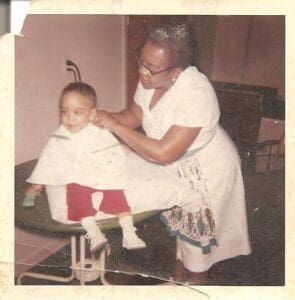
William Hargrove with his grandmother, Thelma Stewart
My father worked for the state of Michigan for over 30 years and, when he retired, wrote three books and numerous essays and articles before his death in 1994. “Buffalo Soldiers in Italy” was his first book and he spent 30 years writing it; it was his hobby and his passion. My parents were also passionate about the African Methodist Episcopal church, and I spent much of my youth in church-related activities.
As a Black person, I want to be defined by my skills and accomplishments, not by the color of my skin.
Art is a part of my life. Langston Hughes sparked my interest in poetry and photography. I did a book report on him in grade school. I still do photography as a hobby and worked as a photographer for Picture This, a studio I owned in Michigan. I still work as an artist and have a small company, Pancake Breakfast LLC, that produces art for greeting cards and YouTube clips.”
Kimberly King, PSS/PCC Supervisor, Maternal Infant Care Clinic, UW Medical Center
“Every great dream begins with a dreamer. Always remember, you have within you the strength, the patience and the passion to reach for the stars to change the world.” –Harriet Tubman
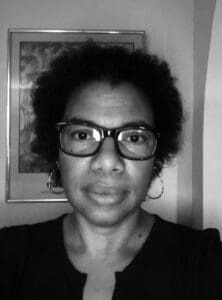
Kimberly King
“I am proud of my ancestors’ journey and the family history that has been both lived and revealed through genealogy. I value where we began and where we are now. We are a people of many dreams and accomplishments. My favorite tradition hails from my paternal grandparents, who were from Louisiana and a part of the Great Migration to Chicago; our tradition is to make gumbo, a delicious South Louisianian dish that we have every Christmas and a favorite in African American cuisine.
My heritage played a part in wanting to work in healthcare. My maternal grandmother wanted to become a nurse when she was young; when my mother was born, she was named after one of the nurses in the delivery room. My grandmother didn’t get the opportunity to become a nurse but my mother in a small way was able to achieve part of her dream of helping others by working administrative positions within healthcare clinics, and this led me to follow in her footsteps to help others in my community, particularly those who are sometimes afraid of the medical system.
I want to see UW Medicine have a continued commitment to programs and services that benefit communities and people of African descent.
My connection to this year’s art theme is that 16 years ago, I took up crafting. I truly enjoy the art of quilting, knitting and crocheting, and one of my dreams would be to pass this art onto the next generation.”
Mark Taylor, RN, Senior Associate Administrator, Harborview Medical Center
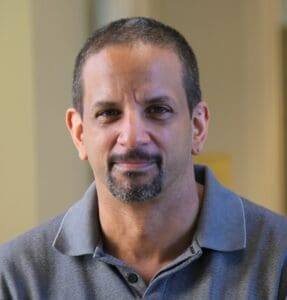
Mark Taylor
“I am a very proud member of the African American community. My heritage provides not only a background and foundation for who I am, but it also motivates me to do what I can to leave the world better than I found it. We still live in difficult times in this country. Daily events in life and in the media show oppression and bias, yet we’re often told that what we experience is not what we’re experiencing. We even often attempt to convince ourselves that what we experience is not what we’re experiencing.
I’ve been blessed to have the position I do and the success I’ve achieved. Thinking of those that have the strength to stand up when they recognize bias and injustice motivates me to do better in my life; they motivate me to make a difference. The daily acknowledgement I feel by other members of the community is one of my favorite cultural traditions. There’s a comfort, welcoming and family feeling that exists from everyday interactions in the Black community. It’s amazing what a simple ‘good morning,’ ‘hello’ or a question about how you’re doing can mean, and we do this for each other every day, even when we’ve never met before.
I work at Harborview because of its commitment to serving the mission. Living as a minority member in this country can take a toll on one’s life. Working in healthcare has been a chance to do what I enjoy, to learn a constantly changing profession and ensure that the experience of ALL people seeking assistance when they’re at their most vulnerable is supported.
I appreciate that UW Medicine has taken the steps to provide recognition of Black culture, that attempts are being made to right the wrongs. This work is just beginning and much more needs to be done. We can’t take our eyes off the goal of becoming an anti-racist workplace. We need to be a leader, create a safe environment and continue to recognize the diversity in our UW Medicine workforce for the strength that it brings.
Thinking about the national theme this year of African Americans in the arts, I love music. My father was a huge Motown fan and my earliest memories are of riding in the car listening to Earth, Wind & Fire, Marvin Gaye, Diana Ross, The Temptations and, of course, Stevie Wonder. To this day, when I hear those artists, I pay attention no matter what is happening around me.”
Editor’s note: Responses were lightly edited for length, clarity and style. Thank you to the UW Medicine employees who have taken the time to share their culture and traditions. Each year, managers are asked to nominate Black self-identified employees to participate in sharing their experience with the broader UW Medicine community.
Any information or opinions shared in this article are personal views and do not represent those of the University of Washington or UW Medicine in any way, shape, or form.
